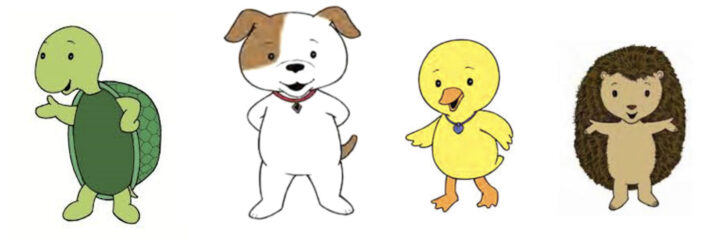PATHS

PATHS (Promoting Alternative Thinking Strategies)
At Slade we use Promoting Alternative Thinking Strategies (PATHS) in EYFS to enhance social competence and understanding in children. PATHS supports the children to develop self-control, emotional awareness and interpersonal problem-solving skills.
Social Emotional Learning Skills
We recognise that our children sometimes display difficulties in social problem-solving, self-control affective understanding and self-esteem. PATHS provides our teachers with a systematic developmental procedure for enhancing social competence and understanding in the children at Slade. We recognise the importance of equipping the children with these skills early on to support them in being successful in their learning.
PATHS addresses the following goals:
- Increased self-control, i.e., the ability to stop and think before acting when upset or confronted with a conflict situation. Lessons in this area also teach identification of problem situations through recognition of “upset” feelings.
- Attributional processes that lead to an appropriate sense of self-responsibility.
- Increased understanding and use of the vocabulary of logical reasoning and problem-solving, e.g., “if…then” and “why…because.”
- Increased understanding and use of the vocabulary of emotions and emotional states, e.g., excited, disappointed, confused, guilty, etc. Increased use of verbal mediation.
- Increased ability to recognise and interpret similarities and differences in the feelings, reactions and points of view of self and others.
- Increased understanding of how one’s behaviour affects others.
- Increased knowledge of, and skill in, the steps of social problem-solving: stopping and thinking, identifying problems and feelings; setting goals; generating alternative solutions; anticipating and evaluating consequences; planning, executing and evaluating a course of action; trying again if the first solution fails.
- Increased ability to apply social problem-solving skills to prevent and/or resolve problems and conflicts in social interactions.
Conceptual Units
The PATHS curriculum includes four conceptual units. The units are:
- Emotional understanding
- Self-control
- Social problem solving
- Peer relations and self-esteem
These units are integrated within the PATHS lessons and are covered at an appropriate developmental level throughout the year.
Emotional Understanding
The lessons on emotional understanding cover approximately 25 different affective states and are delivered by our teachers in a developmental hierarchy, beginning with the basic emotions (happy, sad, angry etc) and progresses to more complex emotional states.
As the ability to label emotional states is a central focus, major emphasis is placed on encouraging such labelling as a precursor for effective self-control and optimal problem resolution.
The children are also taught cues for the self-recognition of their own feelings and the recognition of emotions in others, affective self-monitoring techniques, training in attributions that link causes and emotions, perspective-taking skills in how and why to consider another’s point of view, and information regarding how the behaviour of others can affect oneself.
These lessons include group discussions, role-playing, art activities, biographies, stories and educational games.
Self-Control
The second unit focuses on self-control, a prerequisite for problem solving. In this unit, emotions such as anger and frustration are discussed, differentiations are made between feelings and behaviours, teaching children that all feelings are OK to have but that some behaviours are OK, and some are not OK.
As part of the teaching of self-control, children will be taught some methods and techniques which help them to calm down and teaches them alternative self-control techniques. The Turtle Technique, Three Steps for Calming Down and the Control Signals are also introduced at this stage.
Social Problem Solving
The third focus of the curriculum teaches interpersonal problem solving. The skills learnt in emotional awareness and self-control are prerequisites for learning competent interpersonal problem solving. These lessons build on prior learning and knowledge. Through the use of the Control Signals, children are taught the steps of social problem solving.
Children are taught the steps of social problem solving using the following steps:
- Stopping and thinking
- Problem identification
- Feeling identification Get Ready – What Could I Do?
- Deciding on a goal
- Generating alternative solutions
- Evaluating the possible consequences of these solutions
- Selecting the best solution
- Planning the best solution Go! Try My Best Plan
- Trying the formulated plan Evaluate – How Did I Do?
- Evaluating the outcome
- Trying another solution and/or plan, or alternatively re-evaluating the goal, if an obstacle results in failure to reach the intended goal.
Peer Relations and Self-Esteem
Issues regarding friendship and peer relations are introduced throughout the PATHS curriculum. This occurs both in the context of feelings as well as through problem solving role play.
The issue of self-esteem is covered in a variety of ways including through the regular activity of giving compliments (Paths Pupil of the Day).
The PATHS programme provides our teachers with a systematic and developmental procedure for reducing adverse factors which can negatively affect a child’s adaptive behaviour and ability to profit from his/her educational experiences. The programme is designed to help children:
- develop specific strategies that promote reflective responses and mature thinking skills.
- become more self-motivated and enthusiastic about learning.
- obtain information necessary for social understanding and pro-social behaviour.
- increase their ability to generate creative alternative solutions to problems; and
- learn to anticipate and evaluate situations, behaviours and consequences.
These skills, in turn, increase the child’s access to positive social interactions and provide opportunities for a greater variety of learning experiences. Increasing self-control and reflective thinking skills also contribute to the amelioration of significant underachievement and promote skills which will be beneficial in preventing the genesis of other types of problem behaviours in the future (e.g., alcohol and drug abuse).
In addition, as programme activities become a regular part of the school day, less instructional time is apt to be used for correcting child behaviour problems; in this way, our classroom climate can be set and improved to give children ownership for managing their own behaviour.
